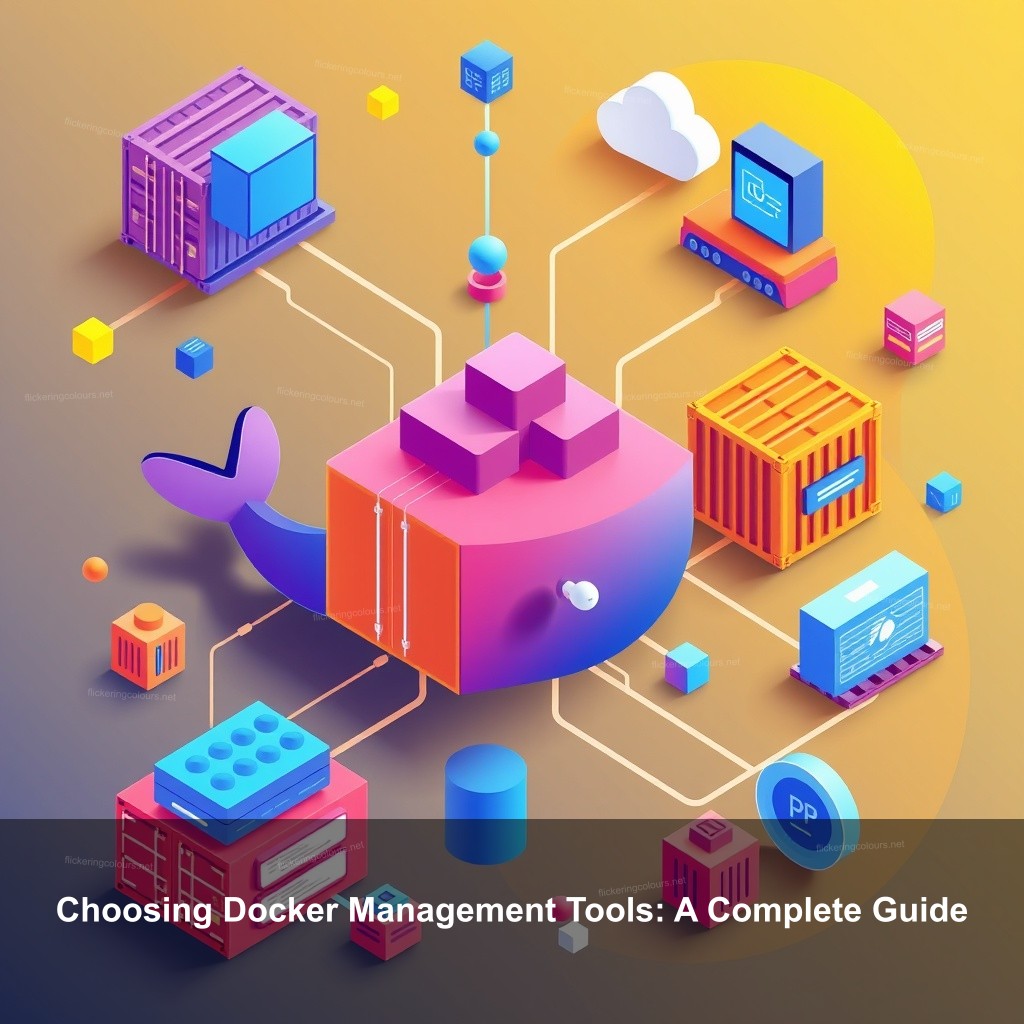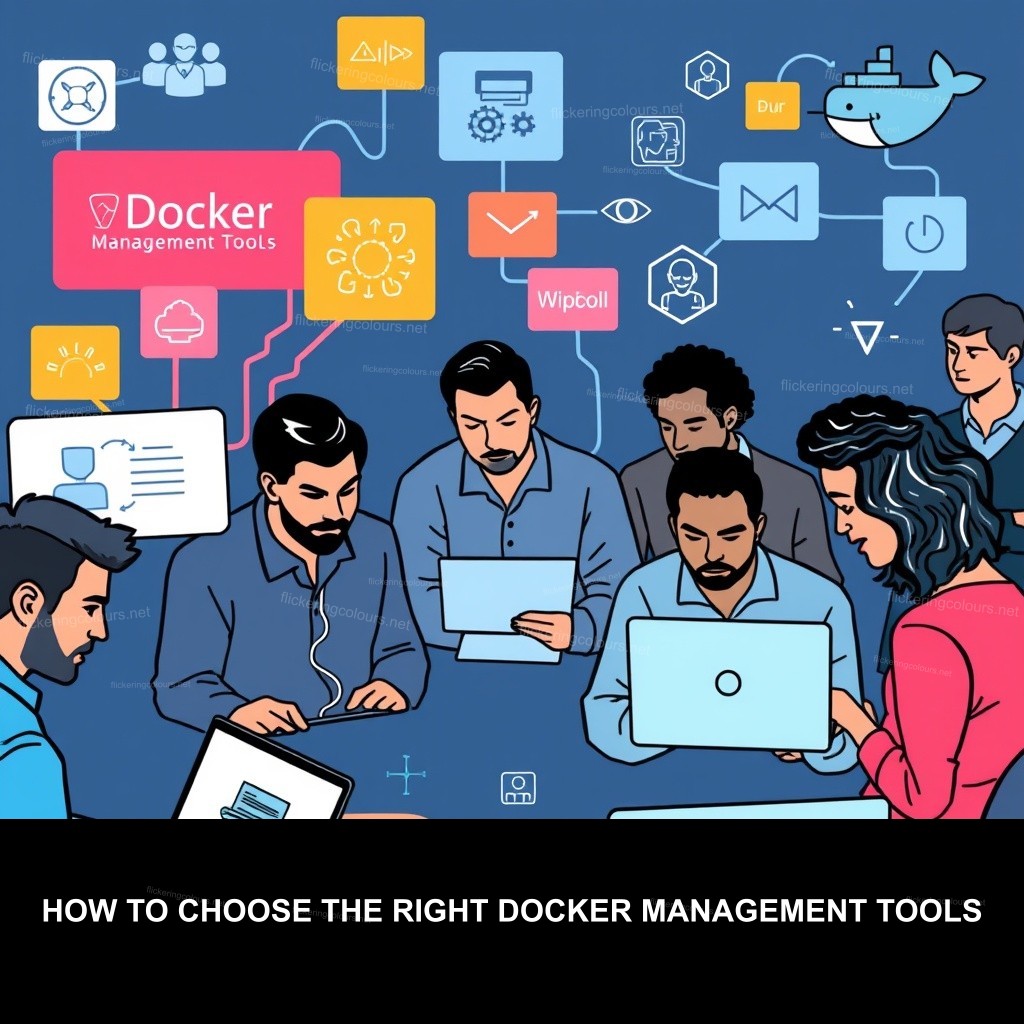Are you looking to optimize your container management with Docker? With so many options available, choosing the right Docker management tools can feel overwhelming. At Flickering Colours Media, we aim to guide you through the selection process, ensuring you have the best tools for your needs. In this post, we’ll explore how to choose Docker management tools, the criteria for selecting orchestration tools, and the best practices for tool selection.

Choosing Docker Management Tools: A Complete Guide
Regarding efficient management of your Docker containers, the correct tools can make a big impact. Knowing what these tools provide guarantees that your applications work effectively and free from faults. An introduction of Docker management tools and their relevance in deployment will be given in this part.
Understanding Docker Management Tools
Oversaw of containerized programs depends on tools for Docker management. They help applications be deployed, managed, and scaled inside containers. From graphical user interfaces to command-line tools, these tools range in form and are all meant to simplify your process.
| Tool | Type | Key Features |
|---|---|---|
| Kubernetes | Orchestration | Automated scaling, self-healing, and load balancing |
| Docker Swarm | Orchestration | Simple setup, native integration with Docker |
| Portainer | Management UI | User-friendly interface, multi-container management |
Choosing the right tool impacts everything from resource utilization to application availability. The wrong choice can lead to scaling issues and increased operational costs.
Importance of Selecting the Right Tool
Selecting the appropriate Docker management tool is crucial. It enables quick deployment, simplifies management, and enhances operational efficiency. A study showed that organizations utilizing the right orchestration tools saw a 30% improvement in deployment times.
In contrast, using inadequate tools can result in longer downtimes and slow application response times. Picking the right management solution is a strategic move for any organization.
Common Challenges Faced Without Proper Management Tools
Organizations that do not use appropriate Docker management tools often face numerous challenges. Issues like poor resource allocation and difficulty in scaling applications can arise, potentially leading to a poor user experience.
For instance, without proper orchestration tools, deploying updates to your application can become cumbersome, leading to increased downtime. Such challenges highlight the need for effective Docker management tools.
Criteria for Choosing Docker Management Tools
Choosing the right Docker management tools involves several key criteria. Understanding these factors helps make an informed decision that aligns with your organization’s goals.
Evaluate Features and Functionalities
Every Docker management tool comes with its unique features and capabilities. It’s essential to assess what functionalities you need. For example, consider whether you require support for multi-cluster management, automated scaling, or advanced monitoring features.
- Multi-cluster management
- Automated scaling
- Advanced monitoring tools
Comparing tools based on these capabilities will help ensure you select one that meets your specific needs. Use comparison tools to analyze features effectively.
Assess Ease of Use and User Interface
A user-friendly interface is a crucial aspect of Docker management tools. A simple, intuitive interface saves time and reduces the learning curve for new users. Tools like Portainer offer streamlined interfaces that make managing containers easier.
When selecting a tool, consider trying out the demo versions to gauge the user experience. This can provide valuable insights into how easily your team can adapt to the new tool.
Consider Integration Capabilities
Integration with existing systems is vital for seamless operations. Tools that easily integrate with CI/CD pipelines, logging services, or monitoring tools can enhance your overall workflow.
Check if the tool supports integration with your current infrastructure. This significantly affects your productivity and the efficiency of your operations.
Best Practices for Docker Tool Selection
To ensure a successful selection process for Docker management tools, several best practices can be followed. These practices will help you avoid common pitfalls and make the best choice for your organization.
Conducting a Needs Assessment
Doing a careful needs assessment is really vital before choosing any Docker tools. Know the needs of your company and the particular difficulties you run with. This can involve evaluating the complexity of your applications and the scale of your installations.
- Assess your deployment sizes
- Evaluate the complexity of your applications
- Identify your specific challenges
Develop a checklist of features that are must-haves versus nice-to-haves to guide your selection process effectively. Tailor this assessment to your organization’s goals and strategies.
Researching Community Support and Resources
A strong user community can be a great asset in troubleshooting issues and discovering best practices. Research the community support available for the tools you are considering. The availability of tutorials, forums, and documentation can enhance your learning curve.
Tools that have active communities typically see quicker updates and more user-generated resources, making them more reliable over time.
Testing with Free Trials or Community Editions
Many Docker management tools offer free trials or community editions. Take advantage of these opportunities to test the tools in your environment. Understanding how a tool performs with your specific applications can be enlightening.
During testing, involve team members from different departments to gather diverse feedback, which can be essential for your final decision.
Comparing Docker Orchestration Tools
Once you have a shortlist of potential tools, it’s time to compare them based on your specific criteria. This comparison will help you visualize which orchestration tool stands out as the best fit for your needs.
Overview of Popular Orchestration Tools
Popular solutions for orchestration including Kubernetes and Docker Swarm have varied advantages. Large-scale installations would be perfect for Kubernetes since it is well-known for its sophisticated tools and scalability. Conversely, simpler setups made possible by Docker Swarm could be helpful for smaller applications.
Consider creating a comparison table to evaluate the strengths and weaknesses of each tool based on your specific use cases.
Use Cases for Each Orchestration Tool
Different orchestration tools cater to different uses. For instance, if your application requires high availability and complex scaling, Kubernetes may be the better choice. Alternatively, if your focus is on ease of setup, Docker Swarm may suit your needs.
Share real-world scenarios and case studies to illustrate how various organizations have successfully implemented these tools.
Cost Considerations
Examining the cost of every orchestral instrument is quite essential. While some programs are free to use and open-source, others could need memberships or licensing for sophisticated capabilities. Find the entire cost of ownership including maintenance, training, and support.
It’s essential to evaluate what fits your budget while considering the potential ROI from using a more robust tool.
Low Competition Keywords in Docker Management
Utilizing low competition keywords can be a strategic advantage in content creation related to Docker management tools. By focusing on these keywords, you can attract a more targeted audience with specific needs.
Identifying Low Competition Keywords
Conducting keyword research can help you identify low competition keywords related to Docker management tools. Keywords like “Docker tool buying guide” and “orchestration platform features” can attract potential users searching for specific information.
Using SEO tools will enhance your ability to discover these keywords and understand their search volume.
Incorporating Low Competition Keywords Effectively
To effectively incorporate these keywords, use them in headings, subheadings, and throughout the content naturally. Avoid overstuffing but ensure they fit seamlessly into your writing.
This approach helps improve your search engine rankings without sacrificing the quality of your content.
Monitoring Performance of Targeted Keywords
Once you’ve implemented low competition keywords, it’s crucial to monitor their performance. Use analytics tools to track your rankings and adjust your content based on what works best.
This ongoing process ensures your content remains relevant and effective over time.

Engaging with the Docker Community
Engaging with the Docker community can provide insights and enhance your knowledge of Docker management tools. Understanding how others use these tools can inform your practices and decisions.
Importance of Community Support
Community support is invaluable when managing the details of Docker. Engaging with forums and user groups can offer solutions to common problems and inspire new ideas.
Join discussions and share experiences to enrich your understanding and contribute to the community.
Resources for Learning and Troubleshooting
Numerous resources are available for those looking to deepen their understanding of Docker management. Online tutorials, webinars, and documentation are great places to start.
Utilize platforms like Docker’s documentation and community forums to stay updated on best practices and troubleshooting tips.
Contributing to Open Source Projects
Consider contributing to open source Docker projects as a way to enhance your skills and network within the community. This involvement can lead to professional connections and opportunities.
Participating in these projects also helps you understand the tool from a development perspective, improving your management skills.
FAQ
What is the best Docker orchestration tool?
The best Docker orchestration tool varies based on your needs. Kubernetes is great for large-scale applications, while Docker Swarm is easier for smaller setups.
How do I choose Docker management tools?
Evaluate features, ease of use, integration capabilities, and cost to select the best Docker management tools for your organization.
What are the criteria for choosing orchestration tools?
Key criteria include scalability, community support, ease of management, and compatibility with existing systems.
Are there free Docker management tools available?
Yes, tools like Kubernetes and Docker Swarm are open-source and can be used for free, though you may incur costs for support and additional features.
How can I improve my Docker management skills?
Engage with the community, take online courses, and participate in open source projects to enhance your Docker management skills.
Conclusion
Choosing the right Docker management tools can significantly improve your operations. By understanding your needs and evaluating available options effectively, you can make informed decisions that drive your success. For more insightful content like this, be sure to explore Flickering Colours Media and join the conversation on optimizing your Docker experience.

Leave a Reply